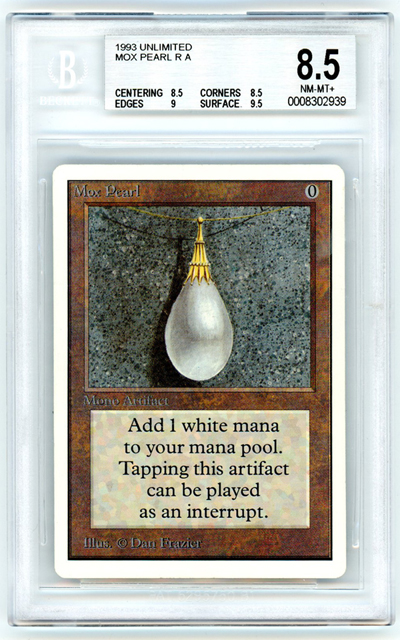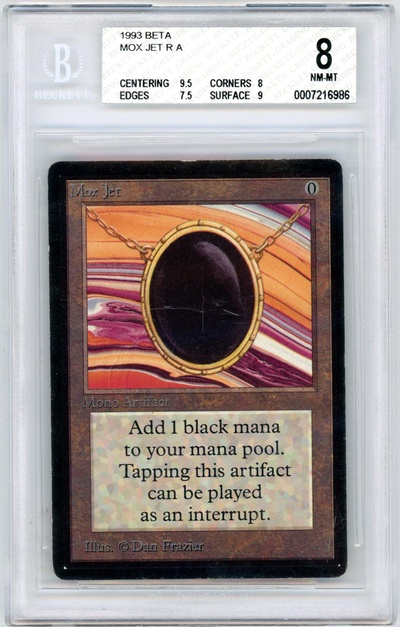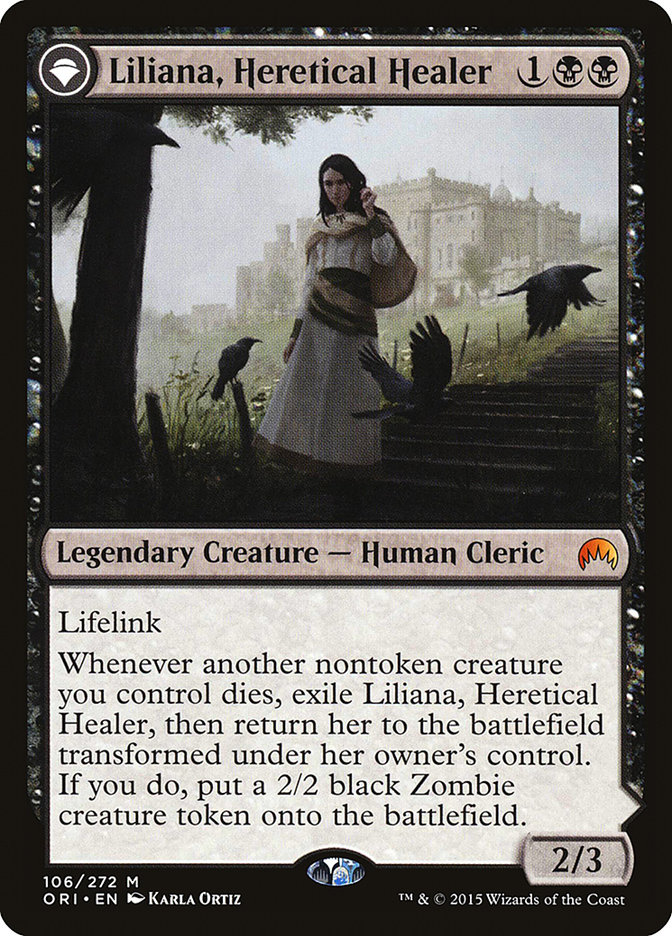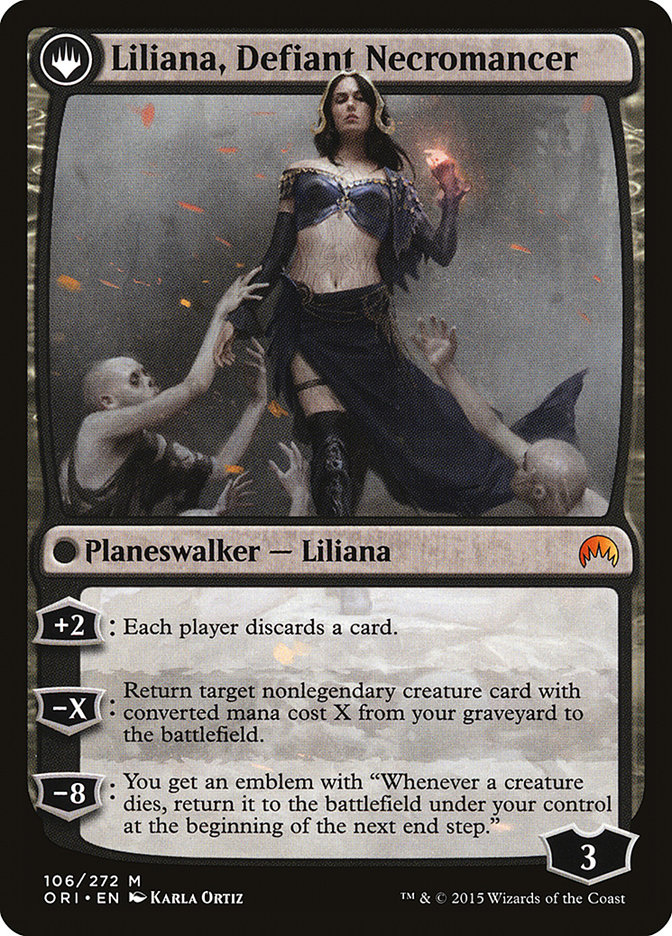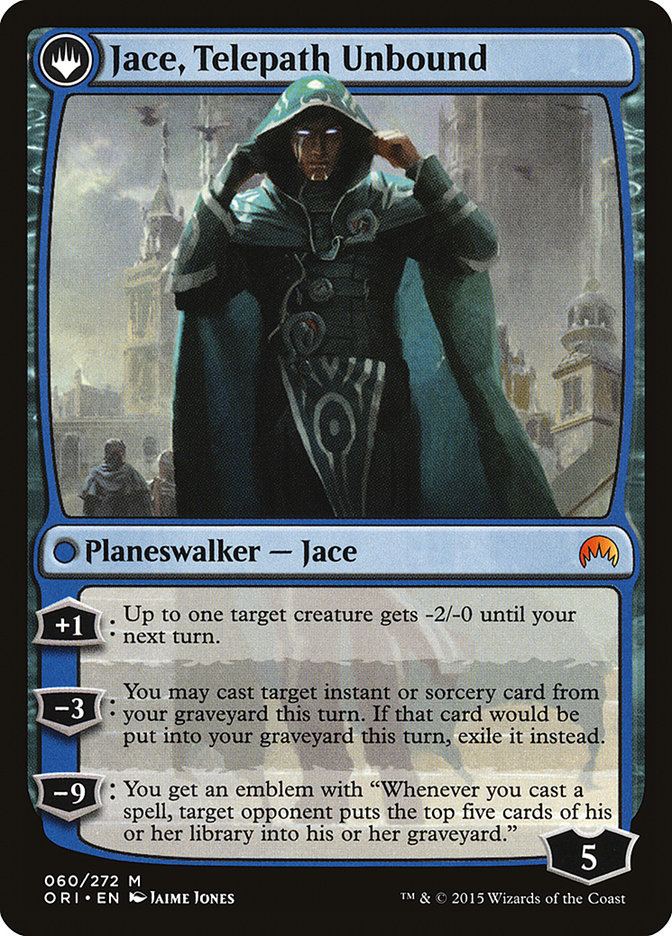Another two weeks, another two stories on Uncharted Realms detailing two more of the Planeswalkers’ tales expressed in Magic Origins. (Of course, this article is going up at the same time as yet another story, but I can’t write about what I haven’t read yet!)
This commentary assumes knowledge of the two stories and openly traffics in spoilers, so if you haven’t done so yet, get to reading:
“Liliana’s Origin: The Fourth Pact“
I’ll give you a Mox Pearl as a spoiler buffer while you read.
My favorite sort of jewelry.
All read up? Right, then. Let’s talk Liliana first.
Liliana Vess: A Disjointed Tale
Both Chandra’s story “Fire Logic” and Jace’s story “Absent Minds” present more-or-less continuous action. They’re not so tight as the classical unities, but both follow their protagonists at a single specific phase of development, adolescence or slightly younger. Liliana’s story, by contrast, takes place in two distinct times set a century or so apart.
The first two parts of the Liliana tale, “Gift of the Raven Man” and “Promise of the Void,” make a welcome return to Dominaria before it got wrecked by the calamities of Time Spiral Block. Originally Liliana’s origin was told differently through the online comic “The Raven’s Eye,” which is still worth a read if only for comparison-and-contrast purposes.
As a spoiler buffer for “The Raven’s Eye,” have some more jewelry.
Fun fact: jet isn’t actually a stone, but it was popular in mourning jewelry.
The only significant points in which “The Raven’s Eye” and “The Fourth Pact” clearly disagree are where Liliana got the poison she used on Josu (“The Raven’s Eye” has the Raven Man give it to Liliana, whereas “The Fourth Pact” has him merely as a tempter, the serpent to Liliana’s Eve) and how she left after the Josu debacle (“The Raven’s Eye” makes her a walking exile, while in “The Fourth Pact” she makes her first planeswalk to get away). It is possible, though not confirmed, that her background as an unapologetic liaison-in-the-storeroom type remains in place. Either way, the two sides of the new Liliana card illustrate a stark contrast: the Heretical Healer, who nonetheless is depicted as being the archetype of modesty in her long white dress, and the Defiant Necromancer, a frank temptress who has zombies literally crawling toward her in their eagerness to be near.
Two utterly polarized – and all-too-common – perceptions of women.
It’s worth noting that in the third parts of both “The Raven’s Eye” and “The Fourth Pact,” time skips dramatically ahead of where the story began. While Liliana is over a century old, her encounter with The Chain Veil is post-Mending and so is her dealmaking with Nicol Bolas. One of Magic’s supreme Big Bads, Bolas is uncommonly helpful when Liliana, suddenly robbed of her agelessness and near-limitless power, wants to get her perks back. What Nicol Bolas stands to gain from Liliana’s introduction to the four demons remains unclear, but the fact that two of them are dead now doesn’t strike me as a coincidence.
Of the five main characters of Magic Origins, Liliana is (probably) the oldest and (probably) the only one who lived during the time before the Mending that robbed all Planeswalkers of their super-de-duper powers. The reason for the “probably” part is that Nissa’s lifetime never has been confirmed, and as an elf she probably has a longer lifespan than a human might enjoy even before the occasional demonic pact.
For now I’ll assume Nissa has lived entirely post-Mending, as her life experiences suggest “mildly powered-up mage” rather than “nigh-invincible elvish nature goddess.” That makes Liliana one of the few living human Planeswalkers to have experienced pre-Mending life. Interestingly enough, this is the second time this year that Magic’s storytelling has grappled with the Mending; the first was in the short story “The Reforged Chain,” when Sarkhan Vol went back in time to witness the epic battle between Nicol Bolas and Ugin, the Spirit Dragon. For a storytelling wrinkle almost a decade old, it crops up surprisingly often!
True to its title “Liliana’s Origin,” the story “The Fourth Pact” tells the two most formative experiences of her life, first her spark ignition in pre-Mending Dominaria and then her refashioning post-Mending as a demon-bargain-fueled killing machine. To the folks who found Liliana’s story disjointed: you’re not wrong. On the other hand, it didn’t come as much of a surprise to me, because I’d seen it before in the comics.
Jace Beleren: Suddenly More Interesting
What did come as a surprise was how much more interested I became in Jace Beleren after reading his origin story.
I’ve seen some complaints about how Jace’s story is just like Chandra’s (correct, to a point) and how Jace’s early upbringing resembles that of a stereotypical nerd (again, correct to a point). Here’s the thing, though. On me, at least, Jace’s story worked. It was true to my experiences, and even though I could dissect the story from both lived and intellectual experience, I can’t deny my emotional response.
It wouldn’t surprise me if most current Magic players were victims of bullying, like I was, and placed at risk of significant physical or psychological harm. Isolation from school peers because of smarts? Again, true to my life, and helping other kids with their homework wasn’t a foolproof way to be liked. Getting taken advantage of because of youth and naivete? Oh yeah, and the only reason I wouldn’t pull a Jace and wipe out that memory is because remembering it will be too useful for the rest of my life.
Like the eponymous character in Ender’s Game or Holden Caulfield from The Catcher in the Rye, Jace Beleren is a young character whose experiences in “Absent Minds” best resonate with the young. I think about who I am now, a thirty-year-old who’s outgrown a lot, and their problems don’t have the same relevance to me these days. But when I think about who I was in high school or college, Ender mattered. Holden mattered.
Jace would have mattered.
The adult Jace still doesn’t hold much fascination for me; his empty shell of a character is not so much a chance for me to imagine myself in the shoes of an Everymalenerd as an annoyance at the chance for characterization wasted.
And yes, there are echoes of Chandra in Jace’s story: the misunderstood mage, the empathetic parent, the manipulative non-family authority figure.
But nothing, not even Chandra’s steam-pack, comes close to Jace’s repeated mental abuse of himself.
“Jace made himself forget what he had seen, forget writing it down, forget forgetting.”
And that self-abuse, later echoed in his behavior in the Return to Ravnica novels among other tales, is nothing compared to what the sphinx did to Jace, reaching in and wiping his memories of acting as an information courier for the double-dealing arbiter – and later trying to wipe out any memory of Jace’s discovery. It was only Jace’s ruthlessness that saved him, his willingness to destroy much of his own mind in order to be rid of the sphinx’s control – ruthlessness that has played out across several novels, comics, and other forms of storytelling.
Jace is still largely a blank as far as his personality goes, and still maddening for that. But now I know why he is that way. He destroyed almost all his memories of home. He barely remembers his own name. He may or may not recall that he had been under the sway of a telepath who had inflicted repeated mental violation on him.
I hope he doesn’t. That would make him even more of a monster than he seems to be in his worst moments. The answer to the last questions of “Absent Minds” – And who is Jace Beleren? Is he a good man? Is he kind? – are “an amoral telepath, no, and no.” But maybe his time as the Living Guildpact will see him mature and turn into a decent human being.
If not, we have his first moments on Ravnica – pounding headache, a misfit once more, an utterly alien world – and then his utterly awkward encounter with Emmara Tandris. At the risk of apologizing for Jace acting like a creep, his upbringing from age thirteen on was not geared toward romance, dealing with such feelings, or even talking with people face-to-face. After all the trauma he’d just been through, if staring too long at Emmara was the worst thing he did on Ravnica that day, it’s not so great a sin.
For making me empathize with a character who’d previously held little of my interest, Jace is winning the contest for best origin story hands-down. Of course, as I write this I haven’t seen Gideon or Nissa yet, so let’s hope they both do even better!

